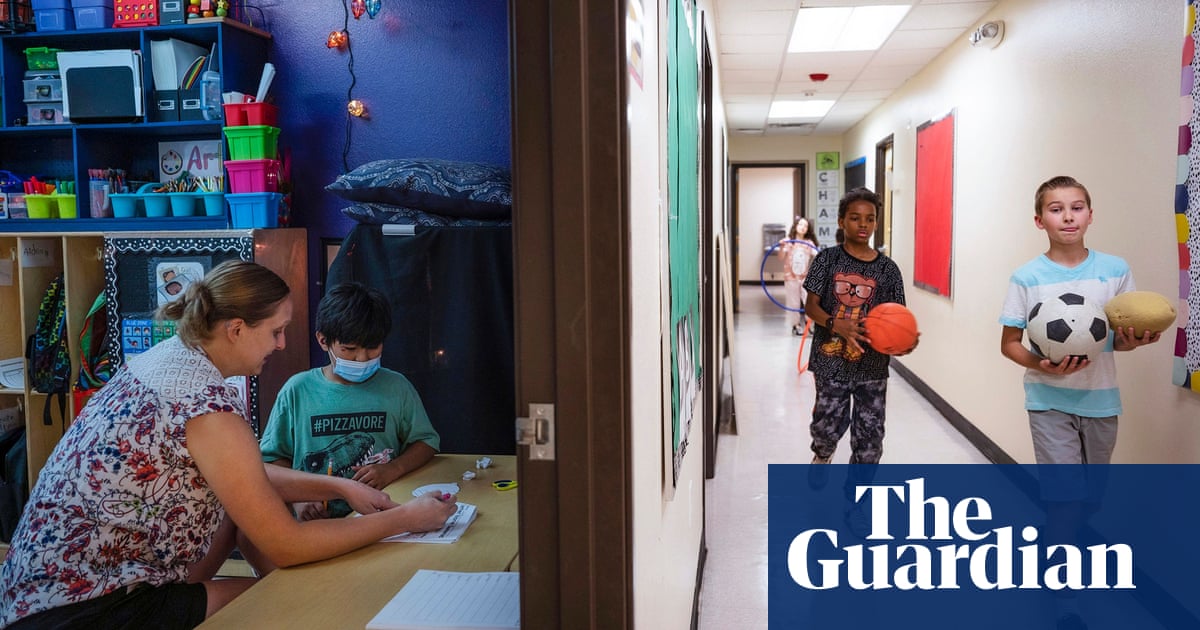
For every apple that lands on a teacher’s desk, there’s a dumpster’s worth of garbage that comes flying their way.
In one of the more perverse developments of modern times, the teaching profession has been cast in the role of key villain of the culture wars. In addition to the long-held attitude of disrespect (“those who can’t teach”, etc), teachers must contend with diminishing resources, internecine power plays that compromise their abilities to do their work, and Republican politicians championing “parents’ rights”, aka decimated curriculums and bookshelves. The pay doesn’t make up for the trouble; the majority of teachers have side hustles to make ends meet.
It’s an untenable situation that Alexandra Robbins renders in absorbing detail in The Teachers, which chronicles the day-to-day plight of the people who devote themselves to our children’s education. The book follows a trio of protagonists over the course of a school year. Miguel Garcia is a special ed teacher in the west, Rebecca Abrams is an elementary school teacher located in the north-east, and Penny Davis teaches sixth grade math in the south (for the sake of her collaborators’ and their students’ privacy, Robbins used pseudonyms, and will not divulge whether the year rendered in her pages fell within the pandemic).
Robbins, 46, started substitute teaching in the Washington DC area in 2019, and ended up filling in as a full-time third grade teacher for an entire semester when Covid decimated the in-person teaching staff. In an interesting move for a writer of breezy nonfiction who has on-the-ground experience, she doesn’t insert herself in the book’s story. Robbins is a cagey talker, opting to keep her camera off in a video interview with the Guardian, and declining to share whether she has school-age children of her own.
Her techniques have proven to be successful. A regular on television news programs, Robbins has made a name for herself diving into subcultures and delivering portraits in novelistic detail (“poolside nonfiction” is a review quote that she relishes). Her previous books are about the inner workings of secret societies at colleges, fraternities and nurses – the other most stressful profession during the pandemic, according to a Gallup poll.
For her latest book, Robbins spoke with hundreds of teachers, and ultimately chose three to feature as main characters. She talked to them on a daily basis, asking detailed questions in order to hear about every tiny victory, resentment and heartbreak in and outside the classroom. She gathered string on the subjects’ dating lives, work nemeses, and diets (grading through lunch hour and subsisting on caffeine is not uncommon). “I’ve been doing this style book for a long time, and the people I follow say it’s like free therapy,” she says. The subjects seized at the opportunity to finally be understood by their friends and families – a sentiment reflected in the book’s rapturous Amazon reviews, the majority of which appear to have been written by teachers who related to Robbins’ text, particularly the line: “I understood how one can love teaching but dislike the profession.”
The most heartbreaking narrative strand is that of Miguel, who works at a majority-minority school that is under threat from a school district looking to transform it into a charter-school-like academy, which would be ruinous for his students. Despite the bite marks and permanent back and arm injuries from being attacked by a couple of special-ed students, Miguel is nothing if not devoted. “He never blamed the students,” Robbins says. “These are students with impulse control issues or communication challenges, but the district wouldn’t send him special special needs aides.”
Robbins says that the most shocking revelations she uncovered during the course of reporting were how fraught relations were between teachers and district officials as well as the odd helicopter parent. “Administrators and parents are so much more aggressive and accusatory to teachers now than they were pre-pandemic,” she says.
Her sympathetic and outraged point of view infiltrates every page, which makes for rousing if occasionally one-sided reading (the bureaucrats and school boards will have to write their own book). “The public stigmatizes the teaching profession, yet also expects teachers to solve all problems and blames them when they can’t,” Robbins writes.
Her voice as an advocate rings most urgently when she is pointing up the fallacy of “teacher burnout”, an expression that became all the more common during Covid. It’s a term that puts the blame on the workers for not being able to withstand the pressures of the job, when in fact the job isn’t meeting their needs. “Experts say that what causes teacher burnout is a lack of proper workplace resources and support and unmanageable workload, high stakes testing and so forth,” Robbins says.
“But instead of addressing those issues, school systems often say, ‘Oh, well. Teachers should just do a better job of self care.’ ”
In a nifty twist for a Yale graduate who has been publishing books since she was 23, Robbins says she does not plan to dive into a new area of research. Once her book promotion schedule quiets down, she plans to focus on advocating for teachers’ rights and return to the world of substitute teaching. The kids like her, and she likes them – as well as the other educators. “I can’t leave the teachers,” Robbins says.
The Teachers is out now












